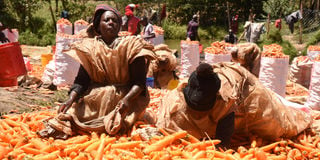'I clean carrots for a living'

Women in Njoro have mastered the art of carrot washing, marking the beginning of their journey to financial independence and self-sufficiency in Njoro, Nakuru County.
In the chilly rural town of Njoro in Nakuru County, a most unconventional transformation is unfolding, and it all starts with a rather unexpected activity - washing carrots after harvest.
In this agriculturally rich area, there is more to this humble vegetable than meets the eye. We are witness to a story of women's resilience, empowerment and triumph.
The bustling streets of Njoro are normally a turbulent arena of loud hawkers and brightly-colored market stalls, but behind the scenes, something extraordinary is happening.
A few years ago, Ruth Njeri found herself in the grips of an abusive marriage that forced her to seek refuge and support for her four children.
Initially, she eked out a living by hawking uji and chapati, making her an income that barely sustained her family's basic needs. However, a chance encounter with a group of women washing carrots at Manacas Ventures Ltd in Mau Narok in Njoro changed Njeri's fortunes forever.
Recognising an opportunity for a better future, she approached one of the women, who agreed to mentor her in the art of carrot washing, marking the beginning of Njeri’s journey to financial independence and self-sufficiency.
The process was not without its challenges.
In the open fields of Njoro, the crack of dawn not only brings the soft glow of the rising sun but also an intense chill that lingers in the air. Dense fog blankets these fields bearing bone-chilling cold as temperatures hover near-freezing point. This is a formidable adversary to the task at hand.

Women in Njoro have mastered the art of carrot washing, marking the beginning of their journey to financial independence and self-sufficiency in Njoro, Nakuru County.
Nonetheless, under these conditions, Njeri was taken through a one-week training that entailed mastering how to hold a sack known as mukirishi, which is the most important tool in the trade.
Men then splash water on the dense piles of freshly-harvested carrots with water and the women, wrapped up in plastic protective gear use mukirishi allowing the rough fabric of the sacks to scrub mud off the carrots.
But despite the initial hardships, she persevered, motivated by the promise of better earnings to cater for her children.
“We use sacks to wash carrots, you must know how to hold it or else you will injure yourself. It was hard at first but my friend encouraged me to keep going for the sake of my children. I used to earn Sh500 from my uji hustle which was so little,” she told the Nation.
Today, Njeri’s day begins at 5 am, as she joins a team of fellow workers at Manacas and together, they tackle lorry-loads of dirty carrots destined for export to neighboring countries.

A man splashes carrots with water and the women in plastic protective gear scrub the mud off carrots in Njoro, Nakuru County.
Armed with resilience and unwavering dedication, she washes more than 15 sacks of carrots each day, earning between Sh1,000 and Sh3,000.
"The cold is unforgiving as we give carrots their sheen. But it is more than that. It’s a metaphorical cleansing, washing away the hardships of the past and ushering in a brighter future.
“My children are now back in school, I can pay my rent and upkeep for my children thanks to this work. It is better than knocking at people’s doors borrowing food and money to raise your children,” Njeri says.
She is not alone.
Emily Kadanje, a former farmer, was forced to abandon her agricultural pursuit after losing her land.
With few options at hand, she turned to carrot washing to survive.
Also Read: The government must lower food prices
Like Njeri, Kadanje underwent rigorous training to master the art of carrot washing. Today, she washes more than ten sacks of carrots daily, earning a respectable income of between Sh1,500 and Sh2,500.
Through hard work and perseverance, Kadanje has not only educated her children but also acquired property —a testament to her determination.
“In this area, there is no other source of employment, it is either farming or washing carrots. I was introduced to this work after failing in farming. You have to brace yourself to persevere in the cold in order for you to earn a living,” she said.
“I have educated my children from this work. My children also work here instead of engaging in criminal activities or leaving for countries in the Gulf to work as house helps. It is better here even if it is tiring,” said Kadanje, who has lived in Mau Narok the past 39 years.
The two women are part of a movement in Njoro reclaiming their destinies and reshaping their communities.
With over 100 women now earning a living from washing market-bound carrots, the impact is palpable with families finding stability and hope. What began as a modest enterprise with 16 members has since blossomed into a thriving community initiative, employing over 100 women daily.
Eunice Murugi, an official at the venture told Nation.Africa they export carrots to Uganda and Tanzania, providing a lifeline to countless families in the region.
She also highlighted the impact of the carrot-washing business on the local economy.
“With the crime rate decreasing and children being educated to university level, the ripple effects are undeniable. However, challenges persist and we are in the process of acquiring better gear for our workers,” she said.
For now, the carrot queens of Njoro are not just washing vegetables; they are harvesting hope, one carrot at a time.





